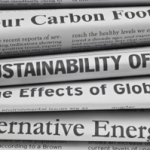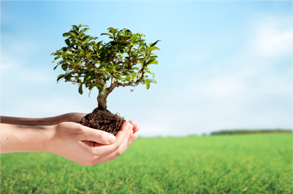A Little on Recycled Paper
With more and more people increasing their efforts to be ‘green,’ a logical step many are taking is adopting the use of recycled paper. While the concept of recycled paper may seem simple, it’s actually more complicated than most people realize. The phrase ‘recycled paper’ includes both post-consumer content as well as pre-consumer content, so just because the packaging says “100% recycled” does not necessarily mean that it’s the ‘greenest’ option available. To be more specific, ‘post-consumer content’ is paper fiber that has completed its lifecycle as a consumer product and has been recovered for use in making new paper. The term ‘pre-consumer content’ refers to material generated in manufacturing but has not completed its life cycle as a consumer product so in most cases this is unused trim and scrap recovered from the mill. On the other hand, ‘virgin paper’ refers to paper produced with no recycled content and requires a fresh source of virgin fiber usually obtained from trees. Stay away from the latter. Here’s an example of how a company’s packaging may mislead you into thinking the paper’s a lot ‘greener’ than it actually is. The packaging says 100% recycled and you think “great!” but also on the packaging (and likely in smaller font) it says 30% post consumer content. In this case, while you probably thought you were buying a product made 100% from other already used paper, only 30% comes from paper that has actually completed its lifecycle and the majority 70% is made from unused excess material recovered from the mill. While this is still better than virgin paper, it is hardly the most sustainable option. If you really want to use ‘greener’ paper, look for the higher percentages of post-consumer content. 100% post-consumer content is best. Additionally, look for the FSC (Forest Stewardship Council) trademark on the packaging. Having the FSC certification means that any wood used in making that paper comes from forests managed in responsible and sustainable ways. Go forth and promote sustainability!
many are taking is adopting the use of recycled paper. While the concept of recycled paper may seem simple, it’s actually more complicated than most people realize. The phrase ‘recycled paper’ includes both post-consumer content as well as pre-consumer content, so just because the packaging says “100% recycled” does not necessarily mean that it’s the ‘greenest’ option available. To be more specific, ‘post-consumer content’ is paper fiber that has completed its lifecycle as a consumer product and has been recovered for use in making new paper. The term ‘pre-consumer content’ refers to material generated in manufacturing but has not completed its life cycle as a consumer product so in most cases this is unused trim and scrap recovered from the mill. On the other hand, ‘virgin paper’ refers to paper produced with no recycled content and requires a fresh source of virgin fiber usually obtained from trees. Stay away from the latter. Here’s an example of how a company’s packaging may mislead you into thinking the paper’s a lot ‘greener’ than it actually is. The packaging says 100% recycled and you think “great!” but also on the packaging (and likely in smaller font) it says 30% post consumer content. In this case, while you probably thought you were buying a product made 100% from other already used paper, only 30% comes from paper that has actually completed its lifecycle and the majority 70% is made from unused excess material recovered from the mill. While this is still better than virgin paper, it is hardly the most sustainable option. If you really want to use ‘greener’ paper, look for the higher percentages of post-consumer content. 100% post-consumer content is best. Additionally, look for the FSC (Forest Stewardship Council) trademark on the packaging. Having the FSC certification means that any wood used in making that paper comes from forests managed in responsible and sustainable ways. Go forth and promote sustainability!
Until Next Time,
The Junk Recycler



Follow Us!